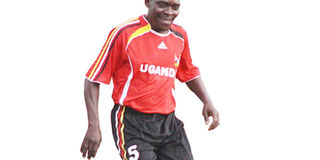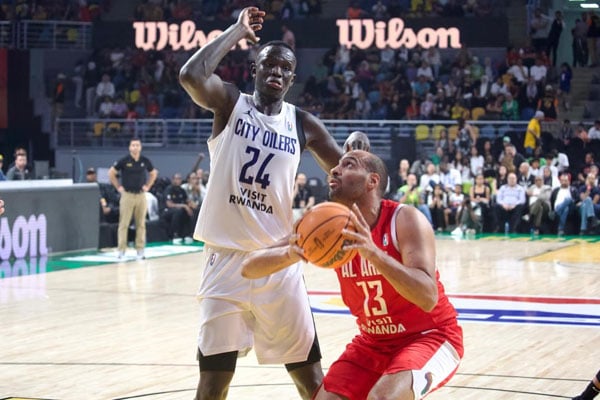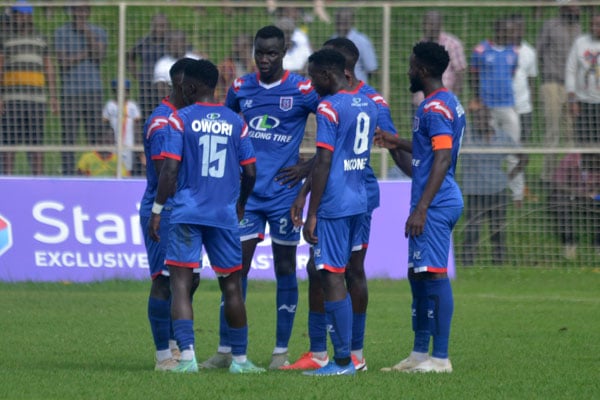Mugisha, Nkata and Nsimbe: Special breed of midfielders

Nsimbe’s training regime, focus and discipline won him many admirers. PHOTO/JOHN BATANUDDE
What you need to know:
KCCA led 2-0 deep inside the second half. Arab Contractors then scored what everyone thought would just be a consolation goal. But in the dying minutes, Yusuf Ssonko handled the ball in the forbidden area to gift the visitors a penalty that they duly converted for the equaliser
Original Maestros. Over the years, Uganda has produced and witnessed a sackful of classy midfielders. The majority were real entertaining artistes and are still the talk of the Pearl of Africa. But there is a special breed of the workaholic midfielders that always wore their hearts on their sleeves while on the playing field. Fred Mugisha, Paul ‘Latest’ Nkata and George ‘Best’ Nsimbe fall in that category. We rewind their clocks today.
GEORGE ‘BEST’ NSIMBE
Nicknamed ‘Best’ after the late Manchester United and Northern Ireland star George Best who is arguably one of the best all-time footballers after he was ranked sixth by Fifa in the Player of the Century ratings of 1999.
Nsimbe earns his stripes as one of those few players that were first summoned to the Uganda Cranes while still a student in Secondary School. He was in Form 5 at Lubiri SS in Lubaga Division. “The news of my calling somehow scared me. What would I do in the Cranes that had superb midfielders like Twaha Kivumbi, Moses Ndawula and Paul Nkata?” he questioned at the time.
Nsimbe says that playing for Uganda remains a dream for every player and it is greatest achievement any one can attain in life. “My KCCA coach Moses Nsereko (RIP) cooled me down and advised me not to panic but to take it like any other league match I was going to participate in.
On reaching the Cranes camp, I saw several other teammates from KCCA and this was when things got easier,” recalls Nsimbe. The hard-working midfielder his Cranes debut match – a Cecafa clash against Ethiopia that Cranes lost 2-1 on November 11, 1988 in Blantyre, Malawi.
Nsimbe started the match ahead of Paul Nkata, who was ill. In 1989, Nsimbe was already an established player and part of the side that won the Cecafa Championship for the first time in 12 years.
Nsimbe remembers that the Ugandan side had so many young and inexperienced players who could not match star-studded side like Malawi and Zambia.
“Those two teams had very good players and how we managed to better them remains a mystery. This should serve as a lesson to current players never to underrate their potential,” advises Nsimbe.
He played for Cranes until 1995 and retired at the age of 33. He passed the test of longevity with flying colours and is currently surprised to ex-internationals aged below 25. “Today’s boys need guidance. They must be taught discipline and etiquette. Unfortunately some of them don’t take their coaches’ advice. You find that some earn more than their coaches – something that makes them disrespect the gaffers,” adds Nsimbe. And how did Nsimbe join KCCA, a club that helped him earn recognition? Nsimbe was in Senior Two when National Insurance Corporation (NIC) added him to their ranks.
KCCA FC coach-player Nsereko scouted him from after admiring his resolute style. “I will never forget the day he came at our training ground and at half time advised our coach (a one Manafa) where to field me. The coach dismissed Nsereko reminding him that he was KCCA coach and therefore should not intervene,” retells Nsimbe.
Nsimbe joined KCCA around the same time with other students like Hannington Ssemazzi from Kitante High School, Richard Galabuzi (St Mary’s College Kisubi) and Sunday Moni.
With the help of Joseph Muleego (RIP), Nsereko helped Nsimbe relocated to Kampala after approaching his father Richard Siambe (RIP) who happened to be a Luo from Kisumu.
“He asked my father to allow me stay with him and also play for KCCA – who would start paying my school fees,” adds Nsimbe.
Nsereko gave the family some money to buy necessities thus forcing Nsimbe’s father decision, who was a staunch supporter of Express FC. That’s how Nsimbe arrived on the Ugandan soccer scene. To Nsimbe, Nsereko, whose 29th Death Anniversary is Wednesday, will also be another father as he owes the late everything he achieved. Nevertheless, Nsimbe’s childhood idol was Phillip Omondi. “I had never imagined that I would one day play in the same team with him. I really thank God for making this possible,” concludes Nsimbe.
NSIMBE FACT FILE
(ACHIEVEMENTS)
- Joined KCCA in 1985 while still a Secondary School student.
- Won the league with KCCA in 1985 and 1991.
- Won the Uganda Cup with KCCA in 1987, 1990 and 1993.
- Was KCCA assistant captain from 1993-1994 and took over in 1995.
- Coached KCCA to league victory in 2008, 2013 and 2014.
- Led Victors to Uganda Cup victory in 2007-08 season
- Coached KCCA, Vipers, Victors, Kyetume, Fire Masters, Saints, Maroons, Azam (Tanzania) and Tusker (Kenya).
l Made Cranes debut in 1988 while in a S.5 student at Lubiri SS.
- Won Cecafa titles with Cranes in 1989 and 1991.
FRED MUGISHA
Once upon a time in 1983, Munno Newspaper Sports Editor Fred Ssekabembe, who was also a founding member of Uganda Sports Press Association (Uspa), went to Cairo, Egypt to cover the African Cup of Champions Clubs first leg match between KCCA and holders Arab Contractors (Now Al-Mokawloon Al-Arab). KCCA went to Cairo expecting the worst with the hosts boosting of a star players signed from all over Africa and beyond.
But KCCA rallied from two goals down to force a 2-2 stalemate. When Ssekabembe published a full page report waxing lyrical about the performance, he referred to the midfield duo of Mugisha and Nsereko as the team’s strongest pillars that left Egyptians wondering how such players could be playing for an amateur club.
During the second leg match in Nakivubo, the pair was joined by Phillip Omondi in excelling and putting up a fantastic display that tore apart the Egyptian team.
KCCA led 2-0 deep inside the second half. Arab Contractors then scored what everyone thought would just be a consolation goal. But in the dying minutes, Yusuf Ssonko handled the ball in the forbidden area to gift the visitors a penalty that they duly converted for the equaliser.
KCCA went on to lose the penalty shootout. It had taken more than a century for a Ugandan team to go through via penalties when facing Arab team thus explaining Arab Contractors’ early celebration at the sound of the final whistle.
For the record, only SC Villa have ever eliminated an Egyptian club through penalties and that is when they bundled out mighty Al Ahly 5-3 from the Africa Champions League in 1991. So after the match Ssekabembe wrote, once again, expressing sadness at the elimination of KCCA - a side he said didn’t deserve elimination as they boasted of the best midfielders in the region. All this goes on to show what type of player Mugisha was.
There was a time when he literally won every Man of Match (MOM) award at KCCA. His partnership with Nsereko was the envy of most clubs, having scripted memorable victories to KCCA during the 1980s.
According to veteran sports journalist Hassan Badru Zziwa, before Mugisha joined KCCA in 1979, he was playing for Coffee, a club that trouble the Mayor’s Boys a lot thanks to Mugisha’s destructiveness. It, therefore, came as no surprise when KCCA fought tooth and nail to sign the enterprising midfielder.
A story is told how Mugisha was one day was seen at training with KCCA and when word reached the Coffee administration, fast and stern measures were taken. Mugisha was forcefully driven away from Lugogo by gun-wielding men and taken back to Bugolobi.
Nsimbe is one of the players that replaced Mugisha at KCCA. He told Sunday Monitor that Mugisha was a special midfielder who could hardly lose steam on the pitch.
“During training he would run for long spells and many a fan would mistake him for a national athlete. Mugisha’s gifts included piercing through opponents’ defences and aerial prowess,” said Nsimbe.
In 1979, Coffee bowed to pressure and allowed Mugisha to join his childhood dream club - KCCA. During his eight-year stint at Lugogo, Mugisha played a key role in enabling the club win three league titles and three Uganda Cups.
He was first summoned to the Cranes set-up in 1978 when the team was preparing for the Cecafa Senior Challenge Cup in Malawi. He retired in 1985 to give way to young players like Nkata and Nsimbe.
Mugisha was born in a sporting family. His three brothers played for various clubs; Francis Kasasira (Bell), Alex Mugisha (Mbale Heroes) and Joseph Gasana (Uganda Clays). He was a product of Old Kampala SS, a school that nurtured so many gifted players like Kirunda, Polly Ouma, Ashe Mukasa and Nkata. Mugisha passed on in 2001 but his legacy lives on – a not so big but very effective and entertaining midfielder.
MUGISHA FACT FILE
(ACHIEVEMENTS)
- Played for UTC, Coffee, KCCA and Bell.
-Won the league with KCCA in 1981, 1983 and 1985.
-Won the Uganda Cup with KCCA in 1982, 1984 and 1987.
- Coached KCCA and Bell.
- Played for Bell and helped club win promotion to the topflight.
-Coached KCCA to Uganda Cup diadem in 1993.
- Named Technical Advisor to KCCA coach Tom Lwanga in 1997.
PAUIL ‘LATEST’ NKATA
Nsimbe, the player that at one time deputised Paul Nkata in the national team describes him as one of the finest and most accomplished midfielders to grace Ugandan football. Nsimbe says Nkata was such a skillful link man that he would mysteriously intercept opponents’ passes and dominate games.
“There is a way he used to dribble opponents using ‘head dummies’. Nkata would pretend to be heading the ball and then skillfully ‘steal it’. Up to today I can’t believe it is me who replaced him in the Cranes set-up,” reveals Nsimbe.
Nkata’s football powers hit their peak during the mid-1980s when Ugandans lacked essential commodities and other products. So whenever new products arrived on Ugandan market from abroad Ugandans would refer to them as ‘Latest’.
His arrival on the scene at Express FC almost caused a stampede. Because his entertaining style of play was unknown then, fans nicknamed him ‘Latest’. To those who knew his family, Nkata’s emergence was not a surprise as there was a football gene in the home.
His four brothers played football to the highest level; George Ssendagala and Eria Ssewanyana both played for Uganda’s oldest club Nsambya FC. The other siblings; Benon Masembe plied his trade for Bank of Uganda in the topflight and Isaac Ssempiira featured for the now defunct Fisheries FC, which was based in Entebbe.
Many players usually want to start careers at places where they’re assured of playing time. But for Nkata, he would start at Nsambya FC – a club that groomed renowned stars like Robert Aloro and Enock Kyembe. But things didn’t go too well for him at Nsambya as he fractured his leg during a National Schools Championship match between his school Kololo SSS and Uganda Martyrs High School, Lubaga. He was forced out for a long lull and when he healed, he opted out of Nsambya.
Nkata headed to Bunnamwaya FC that then played in the league’s second division. Because of the previous injury, he also switched from the forward line to the midfield where he thought there would be less contact with tough-tackling.
It was former Express FC team manager Ashe Mukasa, who in 1982 spotted and signed Nkata. This was how the Nkata joined others like Jimmy ‘Muswayili’ Muguwa, Issa ‘Golden Boy’ Ssekatawa, Simon ‘Mupiira Agaana Atya’ Omba, Fred ‘Gaso’ Mukasa and Emmanuel Mugerwa to turn Express FC into a feared side. By 1984, Nkata had become the talk of town. Little wonder that he was voted the season’s Footballer of the Year.
At Express, Nkata won the 1985 Uganda Cup. In 1991 trouble sparked off at Express when Nkata joined Chris Kasasa, Umaru Senoga and Joachim Matovu among others in trying to desert the club.
Flanked by Matovu, they told the club that they wanted to retire and take on meaningful careers. But when the club management learnt that the players simply wanted free releases so that they would join their pursuers KCCA and SC Villa, the club decided to retain and forthwith suspend them.
Nkata would later use deceptive ways to earn freedom by using Nsambya FC as the club that intended to sign him. When the release was granted, he instead crossed over to SC Villa. He was part of the team that reached the finals of the 1991 Africa Champions League and the 1992 Caf Cup at Villa. He also won the 1992 and 1994 league titles with the Jogoos.
Nkata earned his first senior Cranes cap in 1982 when Uganda hosted the Cecafa Senior Challenge Cup. In 1989 when Cranes won the title, Nkata played the preliminary round before injury forcing him out at the knockout phase. He also featured prominently in the crucial Africa Cup of Nations (Afcon) qualifiers including that 1987 epic one against Cameroon at Nakivubo when Uganda won 3-1.
During the first leg in Yaounde, Nkata scored the Cranes’ lone goal when Cameroon won 5-1. He retired from the Cranes in 1991. On the flip side, Nkata is only one of the few players that Fufa once banned for a full year but later had to lift the suspension as the player was urgently needed for national duty. Other ‘bad boys’ whose suspensions were also lifted by Fufa in the past include Godfrey Kateregga, Paul Hasule and Moses Ndawula.




